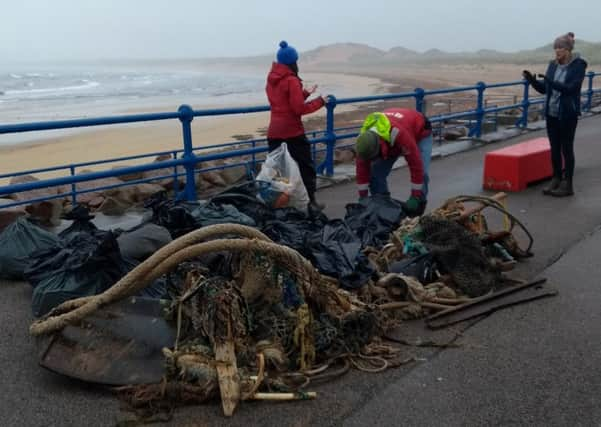Dutch scientists study plastic pollution in Scottish seas


Researchers from the Dutch environmental group By the Ocean We Unite will be sampling water, beach sediment, jellyfish and plankton to discover the impact of microscopic plastic waste on the marine environment.
Plastic litter takes thousands of years to break down and poses a major threat to marine life.
Advertisement
Hide AdAdvertisement
Hide AdAn estimated eight billion tonnes gets into world oceans every year, killing and injuring marine wildlife such as seabirds, dolphins, whales and turtles.
Plastic production has increased 20 fold since 1964, and the amount ending up in the sea has reached shocking proportions.
The researchers say the waters around Scotland, despite being considered clean, contain similar levels of contamination found in other parts of the world - 1,000 to 13,000 fragments (larger than 1mm) per square kilometre.
“Marine plastic pollution is a global threat to marine life,” said Dr Nanne van Hoytema, scientific research coordinator for By the Ocean We Unite.
“Plastics have been found in all oceans, from the tropics to the poles, and compounds associated with plastics have been found by Aberdeen researchers within crustaceans in the deepest trenches of the world.
“Larger plastic debris can entangle marine life, causing animals such as dolphins, turtles and sharks to starve or drown.
“The iconic basking sharks around the Scottish coast may be highly susceptible to injury by plastic fragments as they catch their food by filtering vast amounts of seawater.”
He says cotton buds are one of the most obvious and prevalent items polluting global seas, including Scottish waters.
Advertisement
Hide AdAdvertisement
Hide Ad“You see them everywhere,” he said. “People just flush them down the toilet and because they are able to bypass water treatment filters they end up in the sea.”
The team arrived in Scotland last week aboard the research yacht Fantastiko and will be taking samples from around Loch Ness, Inverness, Lossiemouth, Fraserburgh, Peterhead and Aberdeen during the trip.
They are working in collaboration with Scottish academics and are taking part in talks and beach-cleans en route.
Dr Mark Hartl, associate professor of marine biology at Heriot-Watt’s Centre for Marine Biodiversity and Biotechnology, is due to start analysing jellyfish specimens collected during the voyage.
He believes the studies may shed new light on the ways in which microscopic particles of plastic can get into the food web.
Previous studies have found plastic contamination in jellyfish but it was not possible to determine whether it had been swallowed or picked up when the creatures were washed up on the shore.
He said: “One of the problems we have from collecting stranded jellyfish from the beach is that they have been eroded and knocked around by the waves, and we cannot guarantee whether microplastics have been ingested by the jellyfish at sea or picked up after stranding.
“The samples collected by the team on the Fantastiko will therefore help us get a clearer picture about whether jellyfish ingest microplastics from the water column, thus providing a route for microplastic particles and fibres into the food chain.”
Advertisement
Hide AdAdvertisement
Hide AdThe group is collecting plastic bottles on their travels, which will be used in laboratory experiments to assess the extent to which marine litter adsorbs micropollutants.
Dr Neil James, from the Environmental Research Institute at North Highland College, part of the University of the Highlands and Islands, is heading this part of the work.
“Plastics can act like a sponge, adsorbing and concentrating pollutants,” he said.
“In the marine environment larger pieces of debris can break down into smaller pieces and be consumed by a range of animals, including seabirds, fish and marine mammals.
“By understanding the extent and concentration of pollutants on marine plastic we hope to better understand the extent of environmental contamination and potential implications for marine ecosystems.”
The latest scientific voyage, which is focused around Scotland’s east coast, coincides with a Scotland-wide study of marine plastic pollution being carried out by Greenpeace.